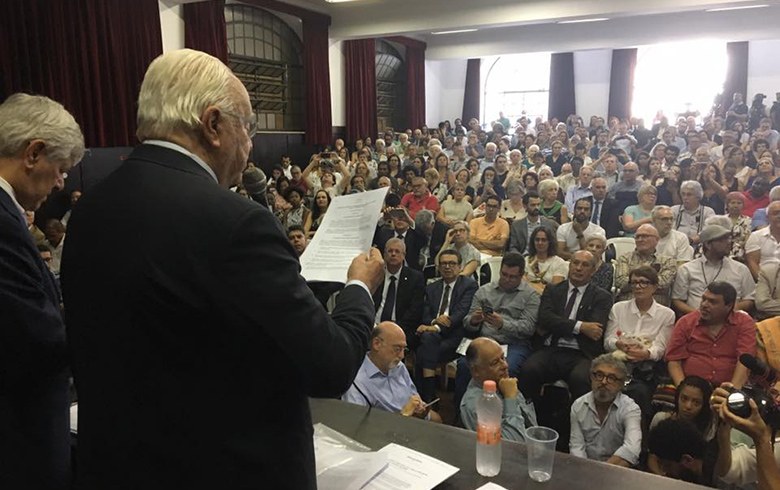ARNS COMMISSION: THE TIME OF ‘STATE ALERT’ FOR DEMOCRACY AND HUMAN RIGHTS

Ler em português | Leer en español
Paulo Sérgio Pinheiro, the president of the association, and former minister, asked during the end of the formation of the Arns Human Rights Commission, that all entities that work in the area “remain on the alert” to combat authoritarianism and violence. “The moment of Brazil is critical,” said Pinheiro.
“The past achievements now put in check deepen the process of ‘de-democratization, he added, emphasizing the plural character of the collegiate, which has 20 founders (check the members at the end of the text). “The Commission has no party. We are not a political front, “he said, expressing concern in opposing, to ‘the present horrors’. The speeches did not explicitly mentioned the Bolsonaro’s administration, but many of them made a clear references to what they call a real threat of political and institutional setbacks, citing the Constitution and the Universal Declaration of Human Rights, which in 2018 coexisted for 30 and 70 respectively.
Deborah Duprat the federal prosecutor for Citizens’ Rights, for example, coined the term “necropolitics” or “tanatopolitics”: “There is indeed a management of collective life that organizes itself from death.” Deborah mentioned the arms decree and the government’s bill that “overestimates criminal law”, she also pointed out “a certain leniency with torture” pointy to a “very strong discourse of authorization to kill.” She also lamented, like others, the extinction of the National Council of Food Security. Noting the existence of a Charter that bids on equality, she added that “we are already living a regime that I would say is almost breaking with this Constitution.”
Aggression on the human rights
Jose Gregori, the dean of the group, also ex-minister , responsible for reading the statute and for the formal formation of the Arns Commission, reinforced the characteristic of the Arns Commission, with its “multiplicity of views” that may even include political opponents. “Each group will have its party supporters, its historical judgments, its preferences. However when the president Paulo Sérgio Pinheiro will opens the next panel, then the political opponents will turn to be partners. ”
For Gregori, the Commission is “self-explanatory”, given the country’s current situation, with human rights being “beaten, distorted, and attacked, not to say that it was only with words.” According to him, any democratic state of law must have two budgets: one economic-financial and another “institutional, democratic and civilizing.”
“We cannot fail to defend this heritage,” he added, recalling his condition as a former student of the Law School of the University of São Paulo (USP) in Largo São Francisco, a São Paulo centre – the Commission was formed this Wednesday ( 20), in the institution’s historic Students Room.
The main objective of the Arns Commission is to give visibility and institutional reception to serious violations of physical integrity, freedom and human dignity, especially those committed by State agents against discriminated individuals and populations, such as blacks, indigenous people, quilombolas, LGBT, women, youth, urban or rural communities living in extreme poverty “.
According to the lawyer Belisário dos Santos Júnior, the group began to be formed last year, after meetings. “In the face of so many cases of hatred, (the participants) understood that it was necessary to continue together,” he recalled, considering that the strength of the Commission comes precisely from its diversity.
Core Values
The sociologist Margarida Genevois former president of the Justice and Peace Commission of the Archdiocese of São Paulo, a reference in human rights activism, became the honorary president of the Arns Commission, a reference to Cardinal Archbishop Paulo Evaristo Arns, whom she knew well. Soon to be 96 years old, in March, she spoke on “articulations” to implement setbacks and defended the preservation of fundamental values of society, citing “the dead and disappeared of Brumadinho”, and more recent the slaughter in Rio de Janeiro and what she called “The everyday violence in the country”.
When addressing the audience Margarida said “I see comrades of many years and many young people.” “We need you,” she added, asking for support from the students. “We may feel fear and insecurity, but we will always remember Dom Evaristo Arns strong voice saying: courage!” Concluded Margarida, recalling a constant cry of the cardinal, who died in 2016.
For Leonardo Pinho the president of the National Commission of Human Rights, the country lives “times of denial, of affront to the democracy” and needs “a democracy of high intensity”. He also referred to the “public authorities trying to deny and rewrite the history of the country.”
Another guest at the opening session, was the activist Toni Reis, the first president of the Brazilian Association of Lesbian, Gay, Bisexual, Transvestite and Transgender (ABGLT), made the most explicit quote to a member of the government, in this case Minister Damares Alves: Our colors are much more than ‘blue and pink’. We have to compose this free rainbow. ” In “times of trivialization of evil,” he defended the tolerance. “Dialogue is not adhesion; it builds bridges and knocks down walls. We will talk with the entire progressive field, “he said, adding that he was also opposed to” the destruction of family’s values, “but to extend this concept.
Reis recalled the ongoing trial on Wednesday of actions calling for the criminalization of homophobia. “We are the only minority that does not have specific legal protection,” he said. After the act, the activist would go to Brasília in order to follow the session of the Federal Supreme Court (STF).
Never has been so many killed in Brazil
Lawyer Rafael Custódio, of the NGO Conectas said that he “never in this country it has been so many charged and imprisoned, it has never been so many killed in Brazil” and spoke of a “new wave of obscurantism” in the country. He added that the country has “one of the most lethal security systems in the world” and a “selective” criminal system. José Vicente a member of the Arns Commission, the dean of the Zumbi dos Palmares University, he quoted the militia men as the snipers, defended for example, by the governor of Rio de Janeiro, Wilson Witzel. He added “We do not want rifles. We want school” he said, citing the” the tidewave that threatens our survival. ”
The law student Laura Arantes, the president of the Academic Centre XI de Agosto, USP, highlighted with a nod to the institution, USP, the symbolism of the location of the Arns Commission’s formation, the so-called Students Room. According to her, during the dictatorship, while students gathered there, to discuss their resistance to the dictatorship, at the same time there, “in the teachers’ room of this house, the Institutional Act number 5″ was written” (the most perverse Act created during the dictatorship) .
Luiz Viana, the vice-president of the Federal Council of the Brazilian Bar Association (OAB) was one of the last speakers – and also spoke about the “dark” times, that Brazil is facing. “There is no democracy if there is no real effectiveness of human rights, and there are no human rights without democracy,” he said. ” Within a violent and exclusionary society, we can only expect exclusion and violence.”
Already in the early afternoon, when the act ended, the jurist and professor emeritus Fábio Konder Comparato commented, with humour, the historical circumstances of creation of the collegiate. “I did not expect this kind of resurrection, coming back to cheer us up after the political disaster. I think it’s vital to work with youth, “added the lawyer, who will turn 83 in October. He believes in reaction to setbacks: “I think we’re going to react.”
Meet the members of the Arns Commission:
* Paulo Sérgio Pinheiro, President of the Commission, professor and researcher, was secretary of Human Rights (Fernando Henrique Cardoso government) and commands independent commission of the United Nations (UN) research on Syria
* Margarida Genevois, president of honor, sociologist and former president of the Justice and Peace Commission of the Archdiocese of São Paulo
* Ailton Krenak, indigenous leader and environmentalist
* André Singer, political scientist and journalist, was spokesman for the Presidency of the Republic during the Lula administration
* Antonio Claudio Mariz de Oliveira, criminal lawyer, former state secretary of Public Security in São Paulo
* Belisário dos Santos Jr., jurist, former Secretary of State for Justice and Defense of Citizenship, member of the Justice and Peace Commission
* Claudia Costin, professor, former minister of Federal Administration and Reform (Fernando Henrique Cardoso government), former Secretary of State for Culture in São Paulo and former Director of Education of the World Bank
* Fábio Konder Comparato, jurist and professor emeritus of the Faculty of Law of USP
* José Carlos Dias, jurist, former Minister of Justice (Fernando Henrique government), former State Secretary of Justice in São Paulo and former President of the Justice and Peace Commission
* José Gregori, jurist and former national secretary of Human Rights (Fernando Henrique government)
* José Vicente, lawyer, dean of the University of Zumbi dos Palmares
* Laura Greenhalgh, journalist
* Luiz Carlos Bresser-Pereira, economist and professor, former Minister of Finance (Sarney government), former minister of Federal Administration and Reform and Science and Technology (both in the FHC government)
* Luiz Felipe de Alencastro, professor and historian
* Maria Hermínia Tavares de Almeida, political scientist, teacher and researcher
* Maria Victoria Benevides, sociologist and university professor
* Oscar Vilhena Vieira, professor and political scientist
* Paulo Vannuchi, journalist, former minister of Human Rights (Lula government) and former member of the Inter-American Commission on Human Rights
* Sueli Carneiro, philosopher and activist of the black movement, director of Geledés – Instituto de Mulher Negra
* Vladimir Safatle, teacher and philosopher
Check out the release of the manifest:
The Commission, for the Defence of Human Rights Dom Paulo Evaristo Arns.
The Brazilian history is marked by serious violations of the most fundamental human rights. Although, the country has never properly addressed this violence, there has been undeniable progress under the aegis of the 1988 Constitution. Thus now we cannot allow any setbacks.
Through the lack of respect for the Human Rights, we feel that incidence can grow because of the characteristics of the recent political process. Where the cruelty affects the most discriminated sectors of the population, with their characteristics of economic, social, racial, religious, sexual, and gender.
Nonetheless in other difficult time, Brazil recognised the importance of human rights organizations composed in a plural way by members of civil society.
These entities have demonstrated, even in dramatic situations, the vigilance necessary to give visibility and legal processing to crimes committed by agents of the State.
The establishment of the Commission for the Defence of Human Rights Dom Paulo Evaristo Arns – Arns Commission wants to help protect the physical integrity, freedom and human dignity of those who may be threatened in this new difficult period of Brazilian history.
Through the presence of participants from previous entities, we intend to gather the experience of the past with a view to preserving the future. This is also the reason to honour Cardinal Dom Paulo Evaristo Arns (1921 – 2016) who, in addition to religious, political, social and ideological differences, was able to join forces in favour of human rights in the most difficult time of the dictatorship regime established in 1964.
From the meeting of old and new defenders of human dignity, the objective of the this Commission will be to contribute by giving visibility and legal follow-up, in national and international instances, to cases of serious violations of human rights. The commission comes to work in an articulated way with the numerous human rights supporter’s organizations already existing in Brazil.
The plural unity of all those who uphold the inviolability of human rights, within the framework of the international treaties and conventions that the Brazilian State has undertaken to respect, is our common direction and common ground.
São Paulo, February 20, 2019.
70 YEARS OF THE UNIVERSAL DECLARATION OF HUMAN RIGHTS
30 YEARS OF THE CONSTITUTION OF 1988
Rede Brasil Atual | Photo: Facebook /Celeiro de Memória | Translated by Solange Lopes, from the Free Lula UK Committee.



